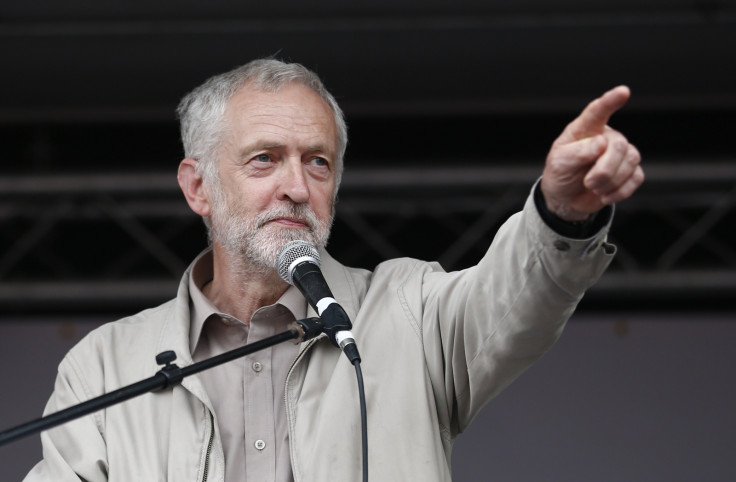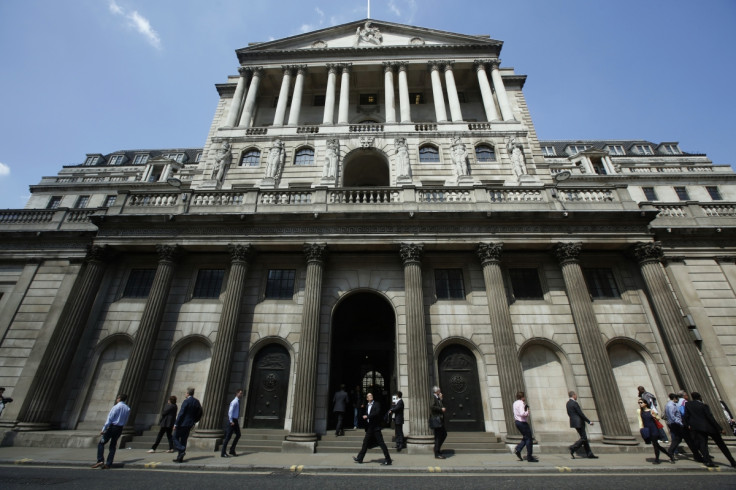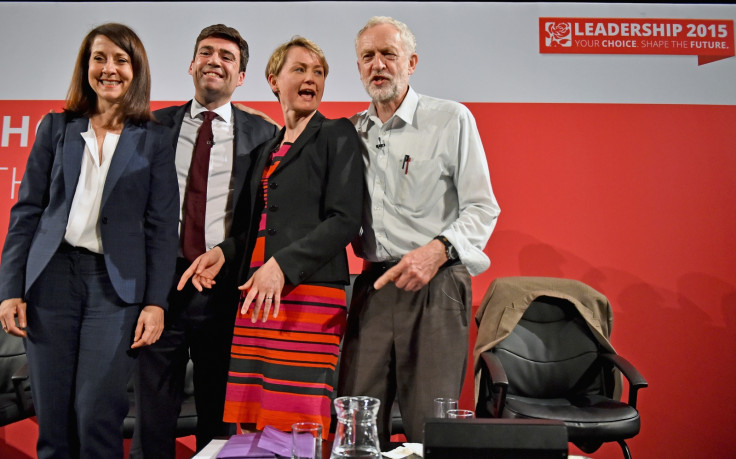Jeremy Corbyn charge sheet: From Russia's useful idiot to his 'friends' Hamas and Hezbollah

Jeremy Corbyn hurtles towards the Labour leadership after an unanticipated surge in support from a party looking to redefine itself after two election defeats and the Blair years. Corbyn is of the hard-left and is branded by critics as the new Michael Foot, who would lead Labour into the political wilderness for years.
But with the help of hundreds of thousands of sign-ups to Labour's affiliate voting system, where for £3 party supporters get a vote on who is the next leader, Corbyn looks set to take the crown. Amid heavy criticism of the Islington North MP, IBTimes UK takes a look at some of the most notable items on his rivals' charge sheet against him.
He has some dubious 'friends'
Corbyn has shared platforms with representatives from and supporters of militant groups Hamas and Hezbollah, who he has referred to as "friends" during meetings. These two anti-Semitic groups are known to have committed terror attacks and have had a number of human rights abuses, including extrajudicial executions and torture. What's more, the founding charter of Hamas from the late 1980s explicitly calls for genocide of Jewish people. So why is Corbyn caught up with these people?
He defends his use of the term "friends" as a throwaway word he used to create a collegiate atmosphere during a discussion. He says he disagrees profoundly with the views of Hamas and Hezbollah. But he also argues that, in the interests of peace with Israel, you have to talk to these militant groups. It's pragmatic, even if critics say Hamas is not really interested in peace and continues to attack Israel during ceasefires.
Yet there is a hint of hypocrisy here. Corbyn is a critic of Western trading and political dealings with repressive regimes. For example, he accuses the British government of turning a blind eye to the disgraceful abuses in Saudi Arabia because it is rich and does business with us. But the defence of governments and officials is that, to bring about progressive reforms, you need a strong relationship with the states in which you are trying to encourage such. Through trading, for example.
Concerns are raised behind closed doors because this it saves the face of regimes and so is more effective than trumpeting about it loudly and publicly. This is the same strain of pragmatism from which Corbyn excuses his association with Hamas and Hezbollah - engage with those you disagree with to bring about progress.
And let's not forget his talking to Sinn Fein, the political wing of the IRA, at the height of the Troubles and amid a republican bombing campaign. Corbyn supports a United Ireland but says he wanted, above all, peace. So that's why he talked to Sinn Fein when others wouldn't. His critics dispute this and cite his voting against the peace-seeking 1985 Anglo-Irish Agreement, to which Corbyn said he was opposed because it strengthened the border between north and south rather than weakened it as he would have liked.

There is more. Such is the concern among many British Jews about Corbyn's associations, the Jewish Chronicle published a list of seven questions that he "must answer in full and immediately" if he "is not to be regarded from the day of his election as an enemy of Britain's Jewish community".
Among them is why he offered support to an under-fire Anglican vicar who posted to Facebook an anti-Semitic conspiracy theory about Israel being behind the 9/11 terror attacks. In a letter to the Church of England, Corbyn suggested the reverend "seems to have come under attack by certain individuals intent on discrediting the excellent work that Stephen [Sizer] does in highlighting the injustices of the Palestinian Israeli situation". Corbyn is yet to respond to the Jewish Chronicle's questions or on his defence of the reverend.
He is one of Russia's useful idiots
Corbyn has described the Kremlin's state propaganda channel Russia Today as "more objective on Libya than most". He has also trodden along the Kremlin's line, pushed by Russia Today, on Ukraine - which Putin invaded, annexing Crimea and destabilising the east by flooding the area with soldiers and arms.
Thousands have died in the conflict. Russia reacted militarily to the ousting of its ally, the corrupt Ukrainian president Viktor Yanukovych. Yanukovych had, against the will of majority public opinion in Ukraine, eschewed closer ties with the EU in favour of deeper economic and political relations with Russia after pressure from the Kremlin.
Following violent protests, in which his armed security services killed demonstrators, Yanukovych fled. The EU and US stepped up diplomatic efforts as Ukraine transitioned to a new government via fresh elections as Russia invaded the east, annexing Crimea and flooding other areas with soldiers and arms.

Russia's line is that a fascist junta took power in a Kiev coup, backed by the US, and Nato is threatening the Kremlin by surrounding it. This is also the Russia Today line. And it's one Corbyn endorses too - that the Ukraine crisis was caused by the West and Nato.
But even a cursory look at the facts shows this to be a facile interpretation of events. With Corbyn lining up alongside the Kremlin narrative, which stands against the activists and democrats in Ukraine who drove out a corrupt president, is he another of Putin's useful idiots in the West? Corbyn has criticised Russia's annexation of Crimea - but he still shifts the bulk of the responsibility for the current war on to Nato. In an article for the Stop The War campaign, he wrote:
Russia has gone way beyond its legal powers to use bases in the Crimea. Sending unidentified forces into another country is clearly a violation of that country's sovereignty [...] Still, the hypocrisy of the West remains unbelievable. Nato has sought to expand since the end of the Cold War. It has increased its military capability and expenditure. It operates way beyond its original 1948 area and its attempt to encircle Russia is one of the big threats of our time.
Nato enlargement after the collapse of the Soviet Union was driven by worried former Soviet-sphere states, newly liberated, who by their own volition joined the defense alliance as an insurance policy against any future Russian imperialism - akin to what we have seen in non-Nato Ukraine.
That's why Baltic states in particular have stepped up Nato patrols post-Crimea to send a message to Russia that they will defend themselves if the Kremlin made any rash decisions to invade. Corbyn disagrees and sees Nato as an aggressive, dangerous arm of American imperialism - so he wants to withdraw Britain from it.
He has outdated, unworkable and unaffordable policies
Corbyn's campaign is harnessing the public anger at the bank bailouts of 2008-09, and the subsequent quantitative easing (QE) stimulus from the Bank of England. They ask why the state is so willing to pump money into the financial system when it claims there isn't enough to maintain, or even increase, government spending.
Austerity, therefore, is a sham. If there is enough money for the bankers, then there is enough money for welfare, schools, the NHS and all the rest of it. So Corbyn is proposing what has been branded "People's QE". According to his economic policy paper: "One option would be for the Bank of England to be given a new mandate to upgrade our economy to invest in new large scale housing, energy, transport and digital projects: Quantitative easing for people instead of banks."

This would upgrade the UK's dated infrastructure, it's argued, at no expense to the public purse while stimulating job creation and economic growth, the tax revenues from which would help close the Treasury's budget deficit. But, leaving aside Corbyn's flawed criticism of the mechanics of the current QE programme, there are several problems with this.
While government investment in infrastructure projects can be good ways to stimulate growth, it's not a guarantee for a number of reasons. Firstly, public works may displace private ones, so there is no actual gain to the economy. In fact, it would cost more. Secondly, there is no guarantee that Whitehall would be better at identifying where and what needs investment than the private sector.
Thirdly, People's QE would need to change the mandate of the Bank of England and give it more of a political role, weakening its independence - where does the political meddling stop? Fourth, helicopter money and political interference in the monetary system will undermine confidence in the integrity and stability of sterling and the wider economy - deterring foreign investors and forcing up the cost of borrowing.
Fifth, there are inflationary risks for consumer prices - everything may get more expensive if more money is pumped directly into the economy. And why not, at a time of unprecedented low interest rates, borrow to invest rather than risk the integrity of your minetary system? As The Economist put it:
One can justify extraordinary measures when the world was crashing in 2009 but the economy has been growing and unemployment has been falling for several years now. However, what government could resist the temptation of using a pliant central bank to fund its spending commitments, compared with the alternatives of imposing taxes on voters or raising bonds from picky international creditors (think Greece)?
People's QE is just one facet of Corbyn's policy offering, which his rival Yvette Cooper labelled "old solutions to old problems". He also advocates renationalising major industries, in particular the railways and energy, because he argues the public should have greater control over key services and that profiteering makes them inefficient and more expensive for consumers. (Incidentally, nationalising the railways is also his rival Andy Burnham's policy.)
But Corbyn is also pro-EU. The EU is seeking to open up expensive, inefficient and uncompetitive protected markets - often fuelled by public subsidies - for the betterment of European consumers. Competition fuels lower prices and higher standards. So opening up markets to more competition is a priority of the EU.
A massive swipe by Corbyn to renationalise whole industries would, as well as coming at huge expense, probably fall foul of European state aid and competition law, exposing Britain to fines. Moreover, proponents of liberalising the rail market in Europe are awaiting the passing of a fourth railway package by the EU in 2015. It seeks to level the playing field across the continent in the passenger rail market, allowing British rail companies to scale up, lower costs and so - in theory - curb prices in a way they were previously unable to because they couldn't enter other protected national markets.
Labour leadership candidates
Jeremy Corbyn
Yvette Cooper
Andy Burnham
Liz Kendall
What's more, Corbyn pins a chunk of his revenue-raising hopes on a £120bn "tax gap" -- the difference between what tax is collected and what tax, in theory, should be collected but can't because of avoidance and evasion. Tax dodging by wealthy companies and individuals is unpopular among the public, especially at a time when public services are being cut back.
Richard Murphy, an accountant-turned-tax campaigner, is involved with the Corbyn camp. He reckons the Labour leader hopeful could, with greater investment in HMRC and tighter tax rules, raise an extra £20bn. He argues it's a deliberate policy of the current government not to chase down harder tax dodgers.
But another tax expert described the £20bn figures as "El Dorado" in a critique of the Corbyn/Murphy plan. The truth is it's very hard, in a globalised world, to close tax loopholes. Doing so requires international consensus, which takes time to build - if it can even be built at all.
There is more the UK government, and others, could do. And there is a case to be made that HMRC is underfunded. But accountants and tax lawyers are clever, quick and adaptable - which is how they stay ahead of the game. If you close one loophole, they'll find another one. So it's best not to rely on mythical tax receipts from the closure of loopholes and the cracking down on evasion.
Many politicians do it - though Corbyn is the most "ambitious" at £20bn - but the reality rarely marries up to the promise. To take one real world example, an information-sharing deal between Switzerland and the UK was supposed to yield £5bn more in taxes. Only £800m came in as people hid their money elsewhere.
He can't win a general election
Winning general elections is what the Labour party is supposed to be about. Not that many of Corbyn's supporters see it that way. Many are arguing New Labour dragged the party away from its socialist principles to the point where it was largely indistinguishable from the Tories. What's the point in being Tory-lite, they say? So Corbyn is the figurehead of a purge, clearing out the "virus" of Blairism and returning Labour to a state of ideological purity. Even if it costs them elections.
The clearest riposte to this is that in order to effect change, you need to be in power. And to get into power, you have to compromise with the electorate in order to win elections. Writing in the Guardian, Alan Johnson, a former Labour cabinet minister, dismissed the attack that the New Labour administration hadn't done anything meaningful.
He listed off achievements such as the national minimum wage, Human Rights Act, Sure Start centres, the right to paid holidays and much more. Those are what you can achieve by winning power, not by remaining in perpetual opposition.

Some of Corbyn's critics dispute that he would lose an election. The majority of the public didn't vote for the Conservatives. In fact, 63.1% voted for other parties. They argue there is a substantial mass of anti-austerity low and middle income people looking for a credible left-wing alternative. And Corbyn's apparently radical vision offers just that to win over not only those who didn't vote, but also win back those who voted for the SNP, the Greens, Ukip, Lib Dems and others.
But there are problems with this. Firstly, there's little evidence that those who didn't vote in 2015 will bother to in 2020. Moreover, there's little evidence that enough of these people share the same views as Corbyn. What's more, even if Corbyn won back all of the seats Labour lost in Scotland in 2015 to the SNP, it would still have lost to the Conservatives by some margin.
And who's to say SNP voters would suddenly swap to Labour when nationalism and a desire for independence - which Corbyn opposes - runs so deep in Scotland? As for the Greens, Corbyn may well be left-wing enough to win support back. But he also runs into the problem that he's not green enough - he wants to reopen coal mines in Wales, for example, which would horrify environmentalists.
Then there are the votes haemorrhaged from Labour to Ukip. Ukip supporters want less immigration and tighter controls, as well as loathe the EU. Corbyn supports a freer immigration system, particularly for asylum seekers, and wants to stay in the EU. So why would Ukip's former Labour supporters put those central concerns aside just to return to a Corbyn-led party?
The reality is that the only credible path to victory for the Labour party is to damage the Conservatives by taking seats from them in England. Corbyn, for obvious reasons, is not the man to convince floating 2015 Tory voters back to the Labour Party. In fact, he risks losing more votes to them in marginal English seats, hurting Labour's chances even further.
But let's entertain the notion that he could win in 2020. For a man who has been among the most rebellious MPs in Labour's history, and who does not as it stands carry the vast majority of sitting Labour MPs on his side, could he even command an effective majority in the House of Commons? Or would he struggle to get his far-left agenda past even his own backbenches?
© Copyright IBTimes 2025. All rights reserved.






















